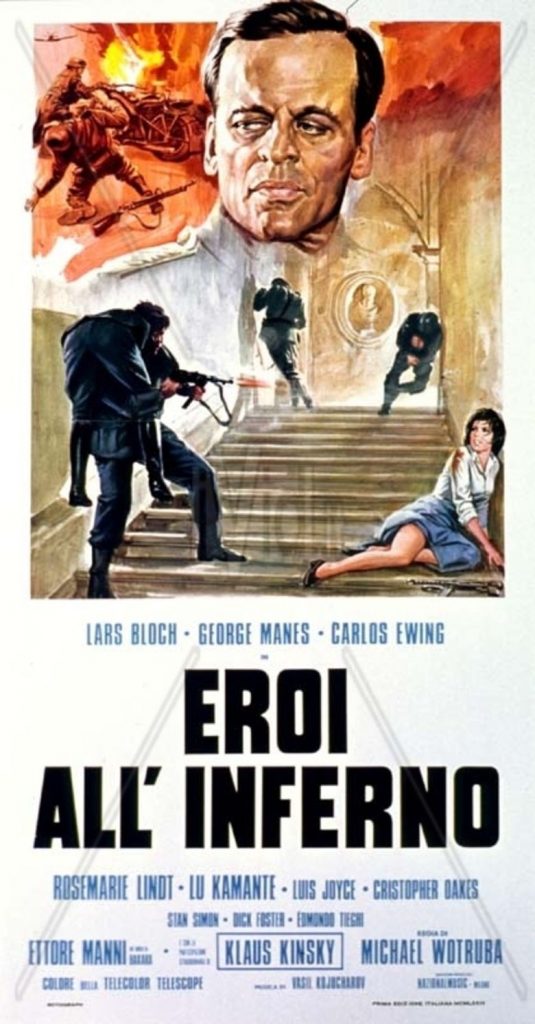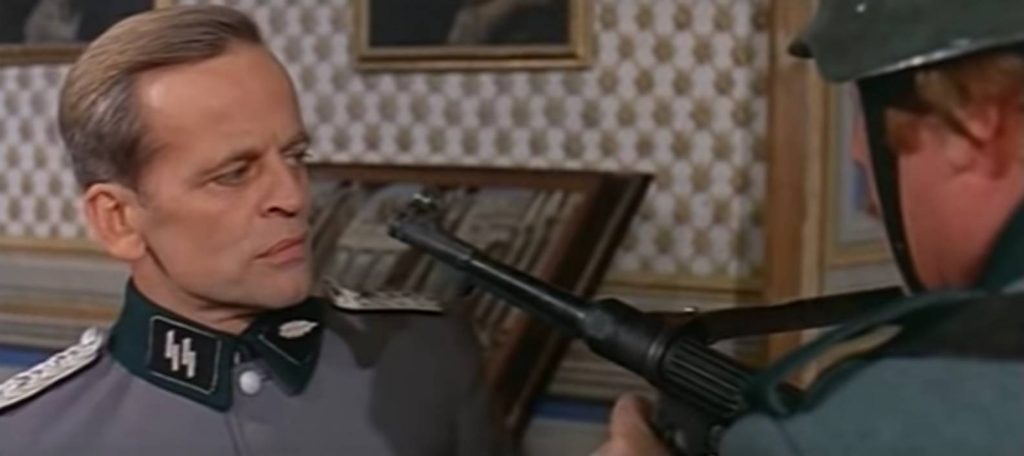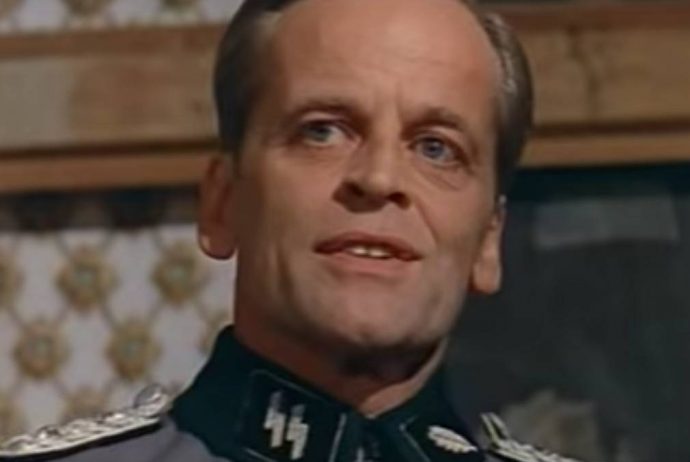Dir: Joe D’Amato (as Michael Wotruba)
Star: Lars Bloch, Ettore Manni, Rosemarie Lindt, Klaus Kinski
It’s rarely a good sign when the amount of stock-footage in a film exceeds the amount of Klaus Kinski. Yet that is basically what we get here. Klaus doesn’t show up until the very end – literally, less than twelve minutes before the end-credits roll. It’s far too late to salvage what is a very plodding entry in the spaghetti war genre. It’s certainly one which does nothing to dispel my belief that Joe D’Amato is a talentless hack, who is best served by sticking to porno.
This takes place in the latter days of World War II, as Allied forces are fighting their way across Europe after the Normandy landings. The film begins with the arrival of a pair of captive Allied soldiers, Captain Alan Carter (Bloch) and his co-pilot, Lt. Stain, at a prisoner of war camp in occupied France. Stain has a shrapnel wound in his shoulder, which introduces us to the camp physician, Bakara (Manni), a man who was driven to drink after the death of his wife, and now functions in an entirely alcoholic fog. I sense Oliver Reed was probably the first choice for this part. However, he still seems to know his medical stuff, and is instrumental in coming up with the escape plan, which we’ll get to shortly.

The problems here start early. Half of the first twenty minutes of this are lumps of stock footage, either rolling behind the opening credits, or during a dream sequence as a delirious Stain relives the events which led up to his capture. On its own, as part of a military documentary, this footage might actually be quite interesting, given its authenticity. However, without any explanatory voice-over, it serves no purpose here, except to pad shamelessly the film’s running time. Though there is some mild amusement to be had from the wild cockpit face-pulling by Stan Simon, the actor playing Stain, which is interspersed with the stock footage.
We then get into everyday life in a prisoner of war camp, which seems to consist largely of roll-call, interspersed with escape attempts. And yelling from the guards. So. Much. Yelling. [Though it is a nice touch that the Germans aren’t dubbed, simply left to speak in their unintelligible native tongue] Now, we get to Baraka’s plan. It is fairly loopy: the sort of thing you’d come up with at the end of a binge of heavy drinking. Or as the doctor calls it, Tuesday… The plan involves rubbing poisonous leaves on the participants, to raise blisters which Bakara convinces the camp commandant are the symptoms of bubonic plague. Somehow, it works, and gets the “infected” prisoners shipped out of the camp, for fear of infecting the rest.
On the road, they break out of the vehicle transporting them, which leads to significant amounts of roaming the French countryside and avoiding the pursuing Nazis. They eventually link up with the local resistance under their commander Julien, including token love-interest, Maria (Lindt). They are working on a plan to kidnap a high-ranking Nazi official present in the area, General Kaufmann (Kinski, naturally!) in order to extract the information he knows about troop strengths, movements, etc. The partisans welcome the escaped POWs, since they could use all the help they can get. Including, apparently, even a thoroughly-soused doctor like Baraka.
Before we get to that, there is some further dawdling to be done, with a subplot involving a local family, arrested by the Gestapo for collaborating with the resistance. Julien bravely gives himself up to save the wife, and the rest of his team ride to the rescue as he and the husband are literally facing the firing squad. It’s another example of the film wasting time on a plot thread which is of no significance or relevance, and could easily be removed. But then, if you removed everything from this which was superfluous, you’d have about 15 minutes of actual content. For finally – and we’re talking well over an hour into a film which runs only 83 minutes – we get round to the attempt to kidnap Kaufmann.

The General, as portrayed by Kinski, is a bit of an art connoisseur, more interested in restoring a lost Da Vinci painting than, oh, rounding up Jews and sending them off to death camps. He believes protecting these works of art is an important part of the occupying army’s duties: “Imagine how the Americans would act,” he declares. “They’d no doubt use these paintings to light fires!” That’s the last straw for his abductors, who have managed to talk their way in to an audience with Kaufmann, and they demand at gunpoint that he hand over the defense plans. The film does manage to generate some moments of tension as they make their way through the building with the captive, or as the lookout outside – who doesn’t speak German – has to handle a conversation with a Nazi soldier. Complicating matters, is that Kaufmann must be taken alive, because… reasons?
It all ends in a moderately-sized battle, though the impact is severely dampened by the movie’s budget not apparently extending to blood squibs. So, when people get shot, they just fall down, like kids playing war in the schoolyard. And there is a lot of this, with not many survivors on either side. It all ends with Baraka, who has somehow managed to survive, staring into the camera, over a montage of all his fallen comrades. If you can find it in yourself to give a damn about any of them, you’re more easily swayed than I. The pacing is perhaps the biggest problem here. There’s no sense of escalation, the film instead lurching from a POW story to a resistance one, then onto the mission to abduct the general, as if D’Amato repeatedly got bored with his own film.
It would be no trouble at all to take the same elements and come up with ways to improve it. Forget the POW aspects entirely, and just focus on a partisan plan to abduct the general. Introduce him way earlier, build him up as an actual character, and have the Allied fighters deal with obstacles as they try to complete their mission. Concentrate on one or two of them, so that their loss has an actual impact. This is basic film-making. That the director here seems oblivious to it, says a lot about his “talents”, as does his almost complete waste of Kinski. Even by the low standards of D’Amato, this is unimpressive, and very definitely the lesser of the films in which he directed Klaus [see also Death Smiles on a Murderer].
